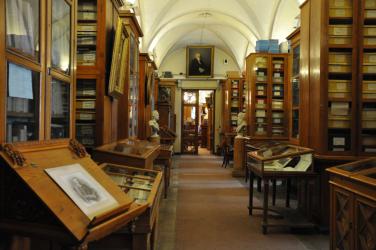Second Half of the 20th Century: the Growth and Arrangement of the Holdings
Among the important private collections of the Old Russian manuscripts acquired by the department in the second half of the 20th century, mention should be made of the collection of the retired Colonel V. Gruzdev (1957), the shipbuilding engineer S. Bystrov (1958 , the writer and collector of northern folklore K. Konichev (1963), an engineer-geologist V. Krylov (1978). In this series, there is a remarkable collection of the preceptor of the Old Believers community M. Yepifanov (1987), consisting of vocal music manuscripts spanning the period from the 17th to 20th centuries.
Separate Old Russian manuscripts, purchased by the Library or received as a gift in the 20th century, made up the New Manuscript Books Collection (NSRC). This collection comprises more than 2 thousand manuscripts of the 15th – 20th centuries and is still growing today.
In 1985, the Pskov Collection was formed from manuscripts brought by the department's expeditions from the Pskov Region. At present, this collection contains 57 manuscripts ranging from the 16th to 20th centuries.The second half of the twentieth century showed a significant growth in the Russian archival stocks, which created a need for their systematic arrangment. Autograph manuscripts by the great Russian woman poet Anna Akhmatova stands out among the large number of personal archives acquired during this period (her archive was received in 1967–1969).
The Eastern holdings continued to grow. In 1964, 103 manuscripts were purchased from a Kazan resident who wished to remain anonymous. In 1971–1974, 80 Muslim manuscripts from the collection of Academician Ignaty Krachkovsky were presented to the Library by his widow V. Krachkovskaya.
Viewed in quantitative terms, new acquisitions to the Western stocks are less impressive, but they, certainly, deserve the attention of specialists on the history of culture of Western Europe.
A remarkable event in the life of our city was the transfer of a small part of the famous French writer Georges Simenon's archive to the Manuscripts Department (1969). The department recieved the autograph of the novel The Train, the preparatory materials for this work, the writer's correspondence, photographic documents, etc. The initiator of the donation was the translator of Simenon’s works into Russian, E. Schreiber. Subsequently, materials from her personal archive were added to the stocks.
In 1983, the Public Library acquired a few Western manuscripts gathered by V. Gruzdev, the Russian part of his collection had come in the Department in 1957. The heirs of the collector offered to buy three Latin and seven German manuscripts dating the 14th, 15th and 16th centuries and four German letters ranging between the 14th and 15th centuries. The two Latin manuscripts of undoubted interest are represented only by fragments. A portion of the 14th century manuscript (22 fols.) contains Prosper of Aquitaine's verses (c. 390–463). The second fragment (24 fols.) is part of the 15th century illuminated manuscript with the epic Achilleid by the Roman poet Publius Statius (c. 45–96). The German manuscripts of the 15th – 16th centuries are theological and legal.
In the same years, the Western holdings were replenished with 4 albums of the 16th – 17th centuries, acquired by the publisher V. Sablin in 1895-1896, while studying at the University of Tartu. Perhaps the most interesting of the three family albums with autographic memory records, is the colourfully illustrated one, which belonged to the Maltese knight Georg von Platen. The fourth album from this group of manuscripts shows drawings of the 17th century German artist mannerist Leonhard Geberlink.
In the 90s of the twentieth century, the department strengthened its acquisition programme with a view to building a comprehensive collection. At that time, a part of the poet Joseph Brodsky's archive spanning his early period of work (1958 – 1972), was transferred to the Library upon his departure abroad.
The department's stocks also were enriched with the archive of Metropolitan Victor (Svyatin), archives of the writers Lydia Chukovskaya, Alexander Kondratov, Alexey Panteleev, Lydia Ginzburg, Victor Sosnorа, Yury Orokhovatsky, the historians Vladislav Glinka and the former Library Director Lev Rakov, the classical philologist Boris Kazansky, the Orientalists Sergey Oldenburg and Vladimir Shileyko, the art critics Olga Vraskaya and Igor Myamlin, the composer Dmitry Tolstoy, the theater director Nikolay Akimov, the film director Ilya Averbakh, the historian and playwright Dmitry Alshits and many others.
Following the traditions of Russian collectors known for their philanthropy, the philosopher and bibliographer V. Petritsky presented the Library with autographs of the 19th – 20th century celebrities in the world of arts and culture. The heirs of our compatriots, famous cultural figures of the Russian emigration, gave their archives to the department. Manuscripts of the literary critic and translator Efim Etkind, the writer Viktor Nekrasov, the founders and director of the Russian gymnasium in Paris Boris Durov were transferred from France; the personal fund of the explorer of the North, naval officer Boris Nolde was sent from Belgium; the aircraft designer and industrialist Igor Sikorsky's archives, the biologist Vladimir Chernavin, materials of the museum at the Rodina society were handed to the Library from the USA; the writer Boris Polyakov' archive were recieved from Israel.
